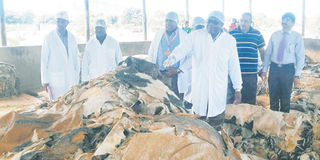Opinions differ on VAT exemption for leather

The permanent secretary in the Ministry of Industry, Trade and Investment, Dr Adelhelm Meru (gesturing), tours Tanzania Meat Company at Kizota Dodoma recently. PHOTO|FILE
What you need to know:
- Producers of leather goods are happy that the move will improve the business but suppliers of hides say they have got a raw deal.
Dar es Salaam. Opinions are divided on the tax waiver on leather and imported capital goods in the 2017/18 fiscal year.
Producers of leather goods are happy that the move will improve the business but suppliers of hides say they have got a raw deal.
Members of the Association of Hide Suppliers (Wangota) say since Tanzania has inadequate factories exempting VAT on procurement and importation of capital goods will not help matters.
Wangota chairman James Matiko told The Citizen that it was also important for the government to also lower duty on hide exports to promote the trade.
According to him, by exempting duty on imported capital goods, only processors will benefit and suppliers will lose as there are only seven hide-processing factories, with low capacity.
“So many abattoirs produce a lot of hides that the seven factories cannot process all of them. There is a supply glut. As a result, more than 1,380 tonnes of hides worth Sh1.66 billion are rotting in warehouses countrywide and other 300 tones have been destroyed. We could export them, but the government raised the tariffs to up to 80 per cent in 2015, saying it aimed at protecting local factories, which are few. During a meeting of stakeholders in Dodoma, processors admitted that their capacity was extremely low. We shouldn’t be scare of competition; it’s healthy in business. It improves product quality.”
However, industrialists maintain the VAT exemption will stimulate growth of small- and medium-sized factories.
The Leather Association of Tanzania (LAT) believes the move will help lower operational costs.
According to LAT executive secretary Joram Wakari, expensive chemicals and other capital goods used in processing leather products threaten small and medium-sized industries.
“Although the budget is still being discussed in Parliament, we are happy that at last the government has heard our cries and proposed such a thing. The government has taken a very important step to improve the sector; we appreciate it.”
He hopes that the move would encourage industrialists to focus on producing finished goods, unlike at present when most of them are in wet blue tanning.
He sees a bright future in the leather industry and that will lead to more jobs and government revenues.
Prof Gabriel Mbassa, of Sokoine University of Agriculture, is also happy that the move will boost the capacity of industries.
“Hides rot because local industries work at only 30 per cent of their capacities. But since the challenge was the high import duties on capital goods – the matter that has been addressed in the budget-- I hope the business will improve.”
He praised the government for not encouraging hide exports.
He urged the government to improve the ease of doing business environment to attract more investors in the industry.
He also said the VAT removal on locally produced animal feeds would boost livestock sector. “This relief will promote the consumption of locally produced animal products.”




